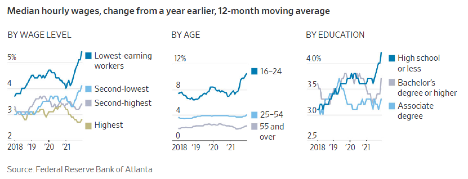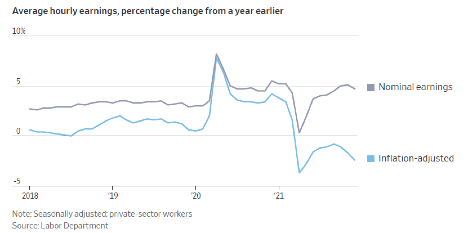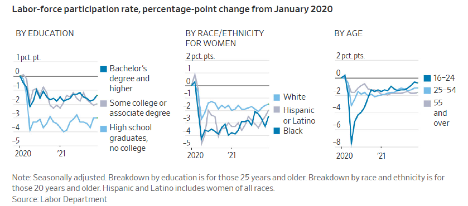The labor market sees a huge shift to worker’s advantage
Companies are desperately looking for workers in order to fulfill orders and service demanding customers. But due to a shift in the American labor market workers are now enjoying having the pendulum swing to their side.

For what seemed like decades, employers had the upper hand in the labor market. There were numerous layoffs, the constant threat of downsizing, and job losses due to advancing strides in modern technology. Workers were in a perpetual state of dread, fear, and anxiety that they would be readily replaced, if not by a cheaper, faster, and more efficient machine, then by immigrants who could work for lower wages. There was also the threat of sending jobs overseas because there were plentiful supplies of workers who would labor at long hours and perform the same tasks as American workers at 25 percent or less of domestic workers.
But due to the onslaught of Covid-19, the economic picture of the United States and of other industrialized countries have seen a dramatic shift in the relationship between workers and their employers. Workers are now more than willing to leave their jobs and even their careers for better opportunities, increased hourly wages and salaries, and even willing to take the risk of starting their own businesses. This revolution in the American and global workforce could be seen as a recent phenomenon that is a short-term situation. But this change could also be seen as the start of a new trend which will redefine the relationship between workers and their employers and either make a more level playing field for both or permanently tip the balance in favor of the labor force.
How this situation started
There are a number of reasons how this situation came to be and which were years in the making. The first being that workers were tired of working for low wages. For many decades, employers held the advantage since they had a vast pool of workers, whether educated, skilled or unskilled and could pick and choose from this supply. As long as there were more workers coming into the workforce, then employers could either be selective as who they wanted or just choose the ones who would work for the lowest wage. Workers were often forced to take lower wages due to a lack of jobs or that employers would not go higher even if it meant getting a livable wage. Workers were too often placed in a bad situation and would accept anything they could get.
Now with firms needing to reopen, workers who were forced to stay home due to the Covid-19 shutdowns, are now being more selective in returning to work. They are playing a game with employers as to coming back only at the wages they demand. If they cannot get the wages they want, they can afford to stay home or take a better offer with an employer who will meet their price.
Another reason as to how this situation has arisen is that more workers have taken early retirement. A good part of the workforce consisted of workers who went to their jobs because it gave them some place to go every day. Many did not need the pay since they could live comfortably on their savings, pensions, and Social Security and Medicare benefits. But the Covid-19 pandemic made these workers realize that there is life after their jobs and for those who had been working since their late teens or early twenties, it was probably time to either retire or just learn to enjoy life. These individuals more than likely wanted to enjoy life before their more senior years and their health would go downhill. Many figured that if they needed extra cash, they could get a part-time job or use a reverse mortgage to help supplement their income. With these workers leaving the system, they took with them years of experience, knowledge, and in many cases, a vital work ethic that could be very difficult to replace. However, by staying home, these workers realized that a world existed outside of their workplace and that it was perhaps time to enjoy it before it was too late.
This situation also came into being due to a shortage of immigrants. Immigrants are a vital source of the American workforce since they can replace retiring workers and usually at a cheaper wage. But due to the severe crackdown on immigration, especially during the Trump Administration, immigrant workers have been hard to come by.
In order for an economy to grow over a span of time, it needs numerous resources. These could be natural resources, financial, technological, and especially human. Of the human resource aspect, there must be both quality and quantity. From a qualitative perspective, there must be a workforce that is highly educated and skilled in order to work with the tools and technology they are given and must use to make a product, provide a service, or invent something new. But there must also be a high quantity of these workers or else these tasks are not going to get done. If there is a lack of babies being born in an economy, then the influx of immigrants can help make up the shortage of workers. These immigrants can be skilled such as engineers, scientists, or technicians that have the education and skill set to help an economy grow over time. Even unskilled immigrant workers are vital since they work as landscapers, in factories, or service employees such as maids in hotels. It is when they are not available that a yawning gap in workers is felt and that employers must scramble to fill that void as soon as possible. While there have been many Americans who have fought against the flow of immigrants coming into the United States, the lack of foreign-born workers is a key reason for the worker shortage we are now experiencing.
The growth of unions
Unions may finally start to see a comeback and it will be workers who will make the push. For too many years, labor unions have been held with disdain by American workers when it was these same unions that helped workers.
The American economy has been shifting significantly since the 1950’s in which it was largely based on manufacturing and blue-collar jobs to service companies and white-collar workers. From the time of the Civil War to the 1950’s, a majority of American workers were employed by manufacturing companies that made products such as automobiles, washing machines, trains, refrigerators, and televisions. Now most of these products are made overseas by a cheaper and larger workforce, while American workers have had to make a shift to service jobs such as marketing specialists, pharmacists, and consultants, to name a few. For these workers, there was either a disdain for forming a union or it was only associated with blue-collar jobs. Service workers were generally college educated, perhaps went to graduate school, and made an above-average salary. Unions were not viewed as necessary to help service workers get into the middle class or beyond. Unions were for other people.
But due to Covid-19, the picture has changed and that service workers are looking to join labor unions for higher pay, benefits, and job security. The same role that unions had in the first half of the 20th century for auto workers, sewing machine operators, and city government workers. Unions are now being formed for workers at Starbucks in order to have better wages and improved benefits.
Perhaps it has been the uncertainty to the American economy that Covid-19 has brought to bear on the growth and comeback of labor unions. Or that service workers are part of the growing trend of the American labor force finally realizing that they should no longer be taken advantage of and rise up as one in order to seek pay equity and fair treatment from their employers. While it will not be easy or happen overnight, a start has been made that could further change the dynamic between workers and their employers with the help of the resurging labor movement.
What the future holds
The future holds a certain degree of uncertainty for American workers. Mainly, how long will this shift towards the worker’s advantage last and what ultimate benefits will they obtain. The pendulum that swings back and forth between workers and employers has been happening in different forms for years. It is difficult to discern how long the pendulum will stay in the worker’s favor, but for now it is changing the American economy through higher wages, and ultimately increased prices for goods and services.







